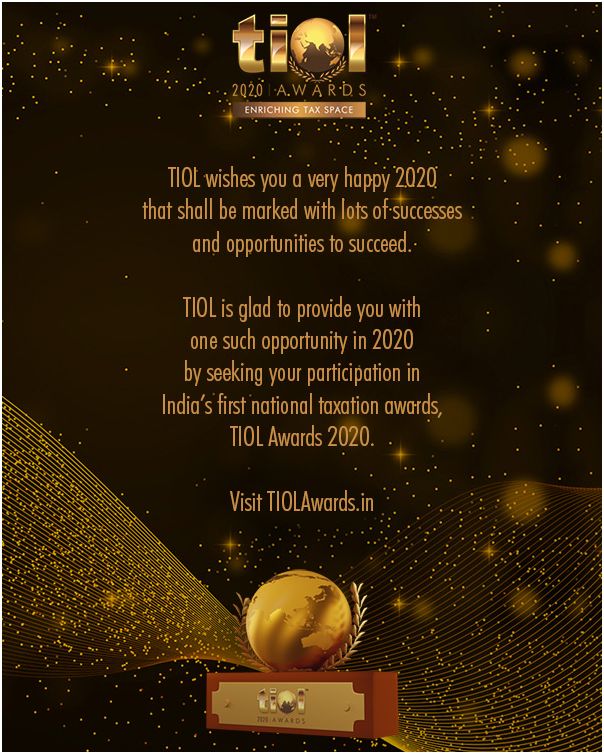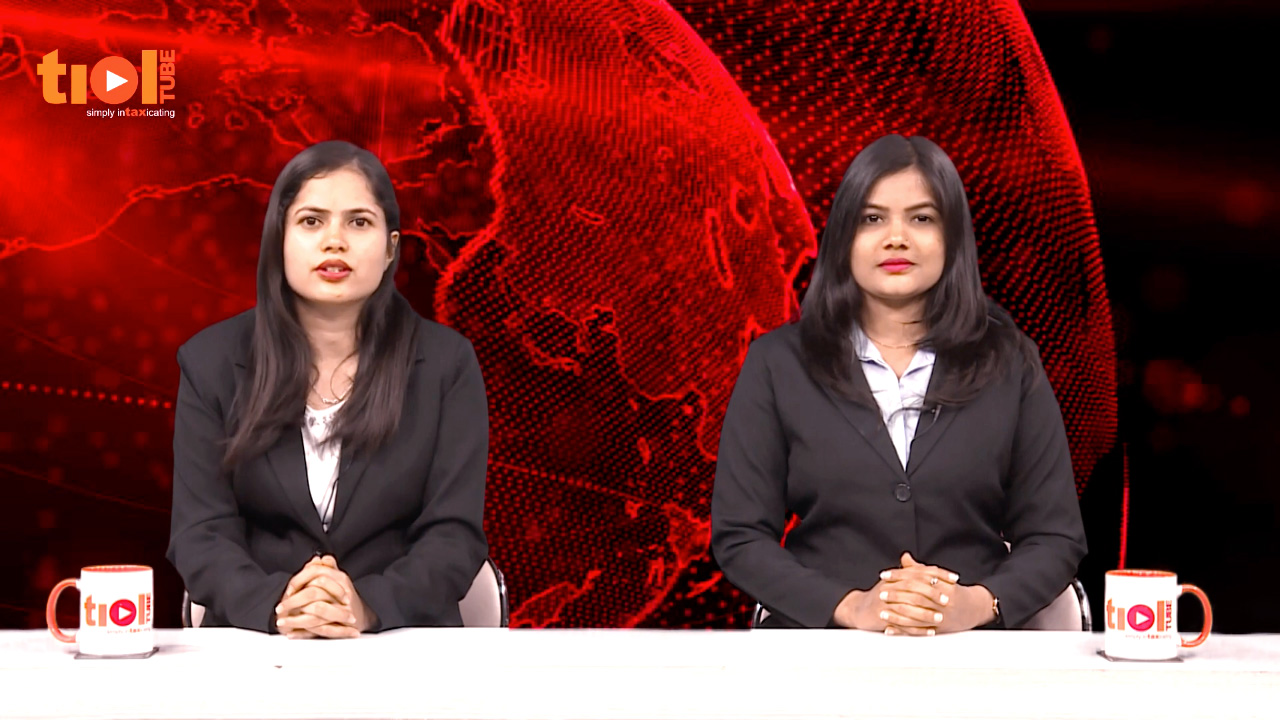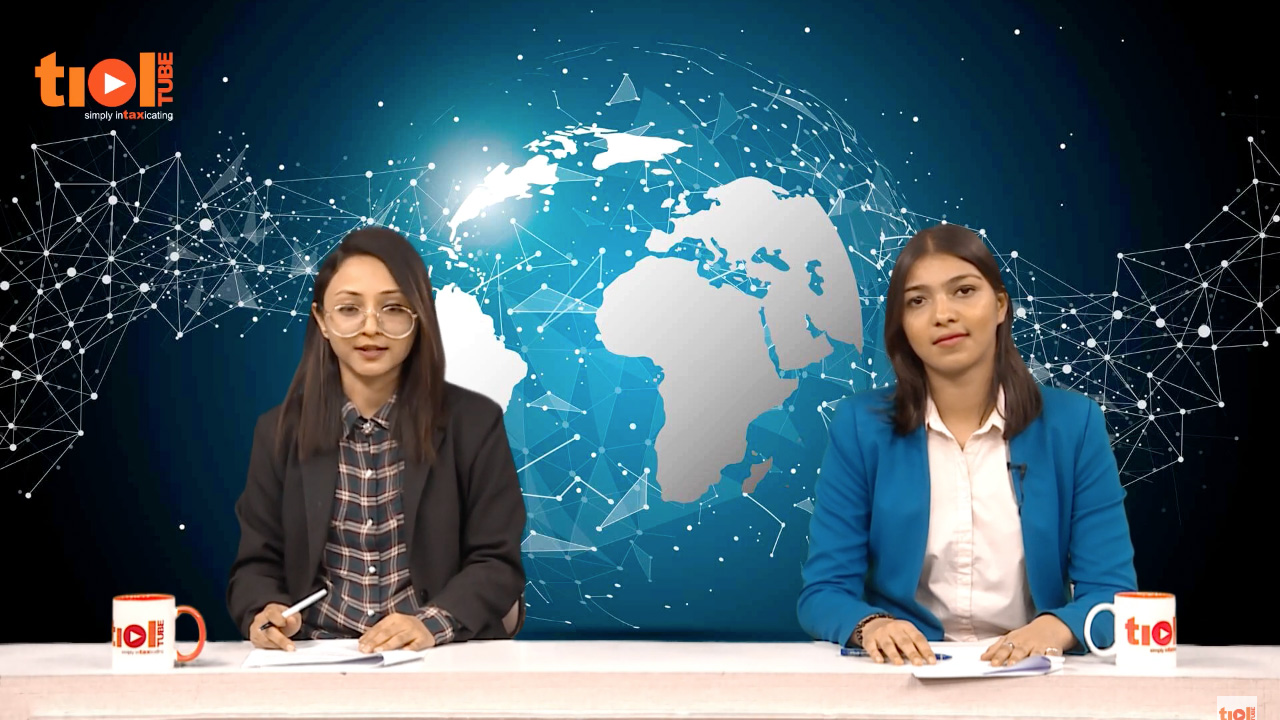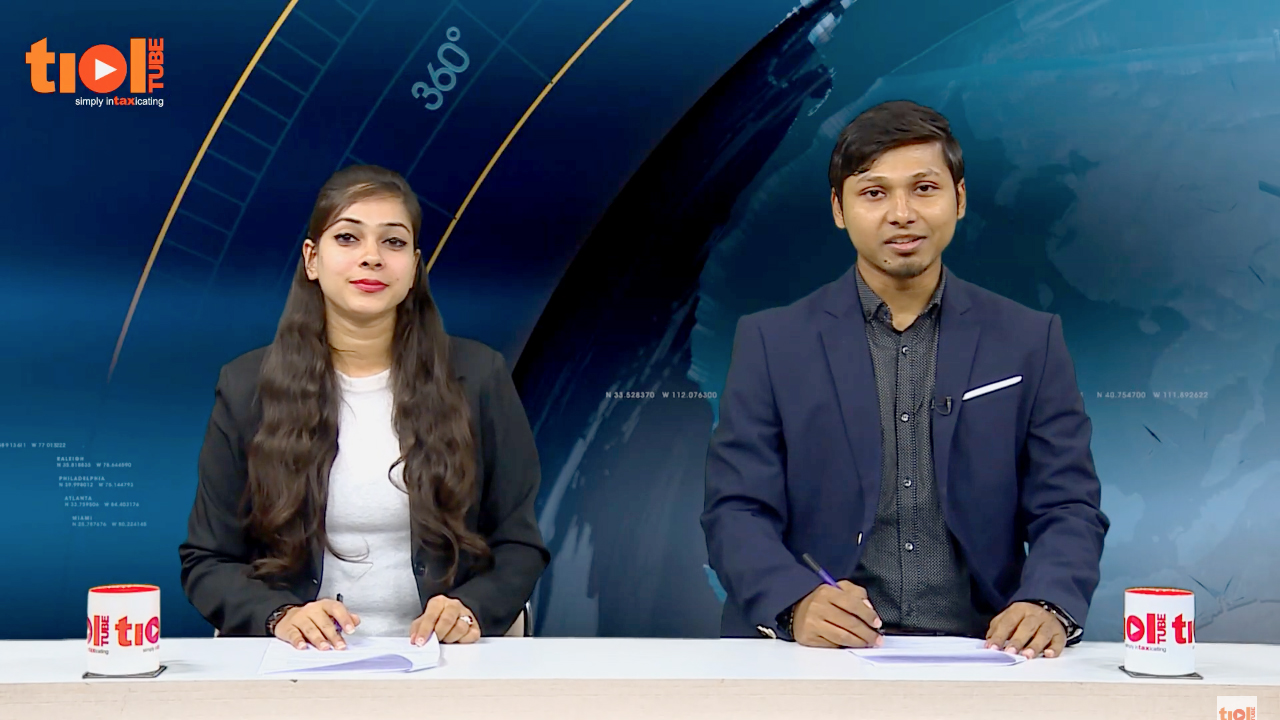2020-TIOL-04-HC-DEL-GST
TMA International Pvt Ltd Vs UoI
GST - Refund of IGST - Collective grievance of the Petitioners for filing the present petition is the denial of IGST refund in accordance with Section 16(3) of the IGST Act, 2017, paid by them on goods exported during the transitional period after introduction of GST Regime i.e. from 01.07.2017 to 30.09.2017 - Under the pre-GST regime, Petitioners used to issue FORM CT-1 and FORM ARE-1, for procuring excisable goods without payment of excise duty and H FORM to avail exemption from payment of Sales Tax - Pertinently, a duty drawback scheme was available to them to neutralize the customs duty, central excise duty and service tax charged on any imported materials or excisable materials used as input services in the manufacture of export goods - Post introduction of the GST, Central Excise and Service Tax were replaced by GST, however, customs remained an indirect tax separate and independent from GST and was not subsumed under the GST mechanism - Thus, post introduction of the GST regime, the drawback scheme was meant only to claim exemption of the customs component of the exported goods and simultaneously, Petitioners could claim refund of the IGST paid on export of goods, in lieu of the excise duty and service tax paid on such goods, since these were integrated into a single tax i.e. IGST - In order to ensure smooth transition to GST regime, Government vide notification no. 59/2017 Customs (N.T) dated 29.06.2017 allowed the extant duty drawback scheme to continue for a period of three months i.e. from 01.07.2017 to 30.09.2017 and during this transition period, the exporter could continue to claim the AIRs of duty drawback specified in columns 4 and 5 of the Schedule of the AIRs of duty drawback notified under notification no. 131/2016-Cus(NT) dated 30.10.2016 - Petitioners exported goods falling under various tariff items mentioned in the drawback schedule, on due payment of IGST - It is claimed that since the drawback schedule prescribed identical tariff rates under Column A [Drawback when CENVAT facility has not been availed] as well as Column B [Drawback when CENVAT facility has been availed], in respect of goods exported and further since there were no guidelines from the GST or Customs department in respect of procedure to be followed in such cases, petitioners inadvertently claimed drawback under Column A, which was mostly between 1.5 - 4% - As per Rule 96 of CGST Rules, 2017 the shipping bill filed by an exporter is deemed to be an application for refund of IGST, paid on the goods exported out of India - In view of the aforesaid provision, Petitioners awaited refund of IGST in their bank accounts - When the same was not credited, correspondence was initiated with Customs Department - On 9.10.2018, Respondent No. 2 issued the Circular No. 37/2018 whereafter the Petitioners have been held disentitled to claim refund of the IGST - As per the impugned circular since the Petitioners had availed higher drawback rates under Column A, they were held not entitled to seek refund of IGST, to avoid multiplicity of refund - Petitioners have thus challenged the aforesaid circular on the ground that impugned notification are without authority of law as none of the conditions for withholding refund of IGST, prescribed under Section 16 of the IGST Act read with Rule 96(4) of the CGST Rules, are satisfied in the present case.
Held: Bench finds merit in the submission of the petitioners that the exporters would not voluntarily opt for the claim of drawback under Column A at the cost of foregoing IGST paid on exports - Where the duty drawback rates under Column A and B were same, the exporters would have received the same amount of drawback even if they would have mentioned "B" in their shipping bills instead of "A" for claiming drawback - Since the condition for not claiming IGST refund is not applicable to cases where duty drawback has been claimed under Column B, exporters would have received IGST refund also on mentioning "B", therefore, exporters did not have any benefit in claiming drawback under Column A - It is not pointed out by the Respondents that the Petitioners derived any undue advantage by their aforesaid mistake and on the contrary, it would result in causing loss for the value of the IGST paid on exports: High Court [para 15]
GST - Refund of IGST - The purpose behind impugned Circular 37/2018 is to ensure that the exporters do not claim AIRs of duty drawback and simultaneously avail tax neutralization under GST as this would amount to exporter availing double benefits of neutralization of taxes - However, the fact remains that at no point of time, the petitioners declared that they would forego the claim of IGST refund - During the transitional period, Petitioners have inadvertently claimed benefit under a wrong provision, since there was lack of clarity with respect to the refund of IGST - Should the Bench deny the benefit simply for this mistake when the cardinal rule is that taxes should not exported? - The concept of zero-rated exports envisaged under GST is designed to achieve this objective - In the current scenario, exporters pay IGST and apply for refund - Thus, for wrong input given at the time of claiming drawback should not deprive them of this valuable right - Bench can't be immune to the fact that taxpayers have faced difficulties in understanding the complexity of GST procedures - Its implementation has not been smooth and the Government itself has faced huge challenges - The model of matching of invoices for purchase, as originally envisioned could not be implemented and a truncated version of returns had to be introduced - This also entailed frequent issuance of innumerable circulars and notifications in quick succession, extending deadlines, introduction of fresh procedures and such other measures - As a result taxpayers were reeling under confusion which continues until this day implying that much needs to be done despite the efforts and measures taken by the Government - The situation is not a happy one and has adverse impact on the taxpayers - There has been influx of cases relating to such issues - Bench is also witnessing many cases relating to transitional provisions - Revenue needs to realise the inefficient implementation of the law has had adverse fallout on the taxpayer - Government would have to embrace initiatives that would help the taxpayers in the transformation to the new regime and this would require understanding the difficulties faced by the industry which would be crucial step for success of GST law - Instant case is one such example where Petitioners have been victim of technical glitches on account of confusion during transitional phase - Bench is of the view that taxpayers like the Petitioners should not be denied the substantive benefit of the IGST paid by them on exports: High Court [para 14]
GST - IGST Refund - If the petitioners have claimed and received only the customs duty portion of the drawback and element of IGST (earlier Central Excise Duty and Service Tax) was not included in the drawback rate, granting of IGST refund would not result in double neutralisation of input taxes - Respondents have also, infact, never intended to deny refund of IGST paid on export in cases where only custom component was claimed as drawback - Petitioners have enclosed the cost analysis which captures the denial of IGST refund causing severe financial crunch to the exporters business - The impact is significant - Such an error, that is purely inadvertent and not intentional, should not come in the way of claiming refund of IGST - Respondents have also been alive to the situation and in matters relating to technical glitches, they have constituted IT Redressal Grievance Committees to address the grievances of the taxpayers - Therefore, there is no reason as to why the Petitioners should not be extended similar benefit - Since the Respondents have expressed their apprehension about double benefit of neutralisation of taxes, it would be appropriate that before issuing final directions, Respondents verify the extent of the duty drawback availed by the Petitioners and also whether they have availed duty drawback / CENVAT credit of Central Excise and Service Tax component in respect of the exports made by them - Respondents to carry out the verification within a period of twelve weeks and submit a report qua each of the Petitioners - Matter to be listed on 27th April, 2020: High Court [para 16, 17, 19]
- Matter listed: DELHI HIGH COURT
2020-TIOL-03-HC-KAR-GST
Samsung R And D Institute India Bangalore Pvt Ltd Vs CBIC
GST - The petitioner sought that writs be issued directing the respondent authorities to allow the petitioner's claim for ITC by accepting the latter's application for refund of ITC under the category of Others either on the online portal or manually for the relevant period - The petitioner also claimed that it be given benefit of Circular No. 94/13/2019-GST dated March 28,2019.
Held - Considering the mandate of Circular No. 125/44/2019-GST dated 18/11/2019 instructing that provisions of the Circular dated 28/03/2019 shall continue to apply for refund applications filed in common portal before 26/09/2019 and the said applications shall continue to be processed manually as prior to the deployment of new system, the relief claimed in the present writ are redressed - Hence the authorities concerned are directed to consider the petitioner's application for refund of ITC as per the Circular: HC
- Writ petition disposed of: KARNTAKA HIGH COURT
2020-TIOL-02-HC-KAR-GST
Cropcare Supplies Vs UoI
GST - The petitioner is a proprietorship concern engaged in the business of agricultural pesticides & fertilisers - The petitioner was covered under the provisions of the Karnataka Value Added Tax Act and later got itself registered under the CGST Act - The Government allowed the claim for transition relief to the registered dealers who maintained the books of accounts - As provided in the Rule 117 of the GST Rules read with Section 140 of the CGST Act, the registered dealer is required to submit a declaration electronically in Form GST TRAN-1 duly uploaded in common portal specified therein - The petitioner claimed to have uploaded form GST TRAN-1 in the GST portal but due to non-filing of a few columns in form TRAN-1, the form TRAN-2 was not uploaded - Hence the petitioner filed a representation before the Revenue authorities concerned, but the same had been rejected - The petitioner also attempted to challenge such order rejecting its representation, but this too was dismissed on grounds that the appeal is maintainable before the CGST authority - Hence the present writ.
Held - The main grievance of the petitioner is that Form GST TRAN-2 could not be uploaded by it on account of some defects in uploading Form GST TRAN-1, more particularly, Part-7B of Table 7(a) of TRAN-1 was left blank - This Court in Writ Petition No.19076/2019 dated 26.04.2019, in the context of uploading of GST TRAN-2 Form on the very same reason of the defective TRAN-1, directed the petitioner to approach the Nodal Officer to avail the benefit of the Circular dated 03.04.2018 to upload the TRAN-2 in GST Portal - Such decision has been confirmed in Writ Appeal No.1840/2019 dated 27.11.2019 rejecting the appeal filed by the Revenue - Hence the order passed by the Revenue authority concerned is quashed - The petitioner is directed to approach the Nodal Officer, who is to consider the petitioner's case in light of the directions issued by this court in Writ Petition No.19076/2019 dated 26.04.2019 as well as in Writ Petition No.33290/2019 and allied matters disposed of on 19.11.2019, wherein the period is extended by 31.12.2019 to furnish TRAN-1: HC
- Writ petition disposed of: KARNATAKA HIGH COURT
2020-TIOL-01-HC-KAR-GST
Amiable Electronics Pvt Ltd Vs JCCT
GST - The petitioner-company is engaged in the wholesale trade in desktop computers, portable laptops, computer accessories, mobiles & gadgets - The petitioner was registered as a dealer under the Karnataka Value Added Tax Act 2003 - On introduction of the GST regime, the petitioner registered itself under the same - Now in order to avail the transit credit of duty of tax levied by the Govt, the petitioner in terms of the transit provisions, electronically submitted and filed Form TRAN-1 - However, the Form GST TRAN-2 was not filed within the due date, on account of the petitioner's CA having left the petitioner's service during the relevant period - After the period prescribed for filing the Form TRAN-2 lapsed, the petitioner attempted to avail the transitional credit by submitting the application, but the common portal was not opened - Hence the present writ was filed, seeking that directions be issued to the Revenue authorities concerned to allow the petitioner to submit Form GST TRAN-2 and allow the petitioner to avail benefit of transitional credit u/s 140(3) of the CGST Act.
Held - The application filed by the petitioner before the Nodal Officer has remained unconsidered - Considering the decision of this court in Writ Petition No.19076/2019 dated 26.04.2019, the Nodal Officer is obliged to consider the application seeking permission to upload the Form GS TRAN-2 electronically or manually - In the light of Section 140 read with Sections 142 and 172 of the CGST Act as well as Rule 117 (1) of the CGST rules and the Circular dated 03.04.2018, the Nodal Officer is directed to consider the application/representation submitted by the petitioner and take a decision in an expedite manner, in any event, not later than 8 weeks' time: HC
- Writ petition disposed of: KARNATAKA HIGH COURT











